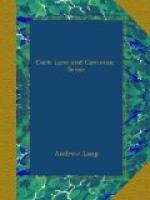More than twenty years ago an attempt was made by a body called the ‘Dialectical Society,’ to investigate the phenomena styled spiritualistic. This well-meant essay had most unsatisfactory results. {17b}
First a committee of inquiry was formed, on the motion of Dr. Edmunds. The committee was heterogeneous. Many of the names now suggest little to the reader. Mr. Bradlaugh we remember, but he chiefly attended a committee which sat with D. D. Home, and it is admitted that nothing of interest there occurred. Then we find the Rev. Maurice Davies, who was wont to write books of little distinction on semi-religious topics. Mr. H. G. Atkinson was a person interested in mesmerism. Kisch, Moss, and Quelch, with Dyte and Isaac Meyers, Bergheim and Geary, Hannah, Hillier, Reed (their names go naturally in blank verse), were, doubtless, all most estimable men, but scarcely boast of scientific fame. Serjeant Cox, a believer in the phenomena, if not in their spiritual cause, was of the company, as was Mr. Jencken, who married one of the Miss Foxes, the first authors of modern thaumaturgy. Professor Huxley and Mr. G. H. Lewes were asked to join, but declined to march to Sarras, the spiritual city, with the committee. This was neither surprising nor reprehensible, but Professor Huxley’s letter of refusal appears to indicate that matters of interest, and, perhaps, logic, are differently understood by men of science and men of letters. {18} He gave two reasons for refusing, and others may readily be imagined by the sympathetic observer. The first was that he had no time for an inquiry involving much trouble, and (as he justly foresaw) much annoyance. Next, he had no interest in the subject. He had once examined a case of ‘spiritualism,’ and detected an imposture. ’But, supposing the phenomena to be genuine, they do not interest me. If anybody would endow me with the faculty of listening to the chatter of old women and curates in the nearest cathedral town, I should decline the privilege, having better things to do.’ Thus it would not interest Professor Huxley if some new kind of telephone should enable him to hear all the conversation of persons in a town (if a cathedral town) more or less distant. He would not be interested by the ‘genuine’ fact of this extension of his faculties, because he would not expect to be amused or instructed by the contents of what he heard. Of course he was not invited to listen to a chatter, which, on one hypothesis, was that of the dead, but to help to ascertain




